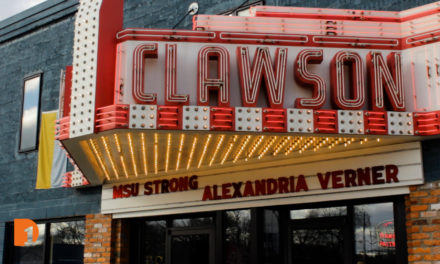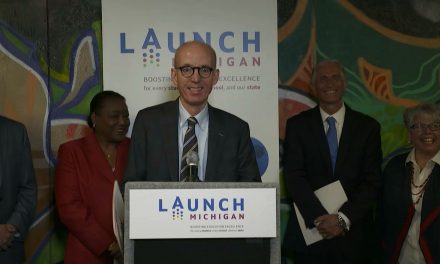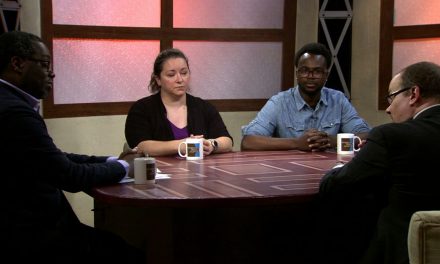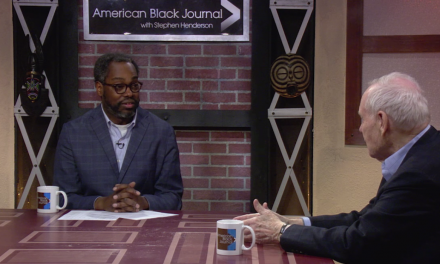As part of American Black Journal’s Black Church in Detroit one-year anniversary episode, BridgeDetroit’s BridgeDetroit’s Engagement Director Orlando Bailey meets with Bishop J. Drew Sheard and his wife Karen Clark Sheard at the Greater Emmanuel Institutional Church of God in Christ (C.O.G.I.C.) for an extensive never-before-seen interview ranging from their roles as leaders of the largest African American Pentecostal denomination in America to a look inside their personal journeys of growth in the Black church.
RELATED: Watch the Black Church in Detroit One-Year Anniversary Special Episode
Bishop Sheard shares his early desires to be a leader in the church from a young age, the strong family foundation that helped pave the way, and how a kid from Detroit’s west side became the leader of the largest Black Pentecostal denomination. Plus, Bishop Sheard discusses the impact of COVID-19 on his church congregation and the increasing need for an online presence and accessibility as congregates tuned in virtually from across the nation.
Then, Orlando turns to Karen Clark Sheard for a closer look at her role as the First Lady of C.O.G.I.C. She talks about her evolution as the First Lady alongside her success as a Grammy award-winning gospel artist with The Clark Sisters. Finally, Bishop Sheard and First Lady Sheard take stock of where their denomination stands today and the importance of the Black church as an institution that works to uplift and progress the Black community and culture.
Abbreviated Transcript:
Stephen Henderson, American Black Journal: Orlando Bailey, great to see you here on “American Black Journal.” We’ve been at this for a year now, talking about the Black Church in Detroit and its importance to people in Detroit and to the culture in Detroit. I really wonder what your favorite moment, though, was in that last year?
Orlando Bailey, Engagement Director, BridgeDetroit: Oh man, it’s been a tremendous year, and the thing that stands out for me is the opportunity to sit across from, in a socially distanced way, the Bishop Edgar Vann of Second Ebenezer Church. An amazing Detroiter and one whom I will call, you know, Detroit’s pastor, right, with that, with that amazing voice. And we had the opportunity to talk about just how he sees the role of the black church in the progression and upliftment of black folks in the past, and, you know, in the present, and it was a really palpable, relevant, real and open and honest conversation. Talking to Bishop Edgar Vann, that was my mentor.
Stephen Henderson: And in so many ways, you’re right. He does symbolize not just the church in the congregation he leads here in Detroit, but he symbolizes the relationship between clergy and culture, clergy and politics, clergy and civic duty here in Detroit in a way that that that most other people don’t. And I think that was kind of a pivotal part of the series, was getting to the essence of somebody like that and the role, the role that they’re playing.
Orlando Bailey: Yeah, and how he has been able, for decades now, to navigate all of those roles. Pastor, dad, husband, one time, a Police Commissioner and Appointee to this board and that task force. I mean, he’s a he’s a polymath and he’s still at it, and it was an honor to be able to sit across from him. It wasn’t a Zoom interview; it was in person across from him and we had that conversation. My grandfather was one of his mentors, and so it was it was a full circle moment, yeah.
Stephen Henderson: Wow. So, we’re not done with the Black Church in Detroit. How could we ever be done with a subject like that, but certainly not after a year, and we’ve got lots of new material for viewers. Tell me about what you have coming up.
Orlando Bailey: I am so excited about this. I had the opportunity to interview Bishop J. Drew Sheard and Lady Karen Clark-Sheard. I say, Karen “The Clark” Sheard, I mean, she is a legend in her own right. And you know, Bishop Sheard, within the last year, ascended to the Chief Apostle leadership role of the Church of God in Christ, which is the largest African-American Pentecostal denomination in the world. And I wanted to ask him how significant it is for the leader of that denomination to be based in the largest majority black city in the United States of America.
And what that means for Black America and what that means for the City of Detroit. We had a really open and honest conversation, you know, about the journey, his ascent, the ups and downs. While he was coming to power, he lost both of his parents to COVID complications. And so there’s some, you know, exuberant moments there, but there’s also a pensive sadness that he still carries and that he’s working through. But it was an amazing conversation. And you know, his wife, Karen Clark-Sheard, First Lady, multi-platinum selling gospel artist, Legendary just in her own right, talking about the ever evolving role of First Lady; it was an amazing conversation.
Stephen Henderson: Yeah. All right, let’s take a look.
Orlando Bailey: So Bishop Sheard, I want to start with you. You are the leader of America’s, of the world’s largest African-American denomination, The Church of God in Christ, right? How does a J. Drew from Sorento on the west side of Detroit, rise to be the presiding bishop of the C.O.G.I.C Church?
Bishop J. Drew Sheard, Greater Emmanuel Institutional C.O.G.I.C: Well, I had great parents. I mean, they instilled in me this godliness form of godliness and I’ve always, from the time I was in the fifth grade, always aspired for leadership. And I worked at it, to be an effective leader in my school while I was going through school. And, you know, God, had an encounter with God as a very young child. And I was always very sincere about God and the church. I love church. This is, I’m the kid that would gather everybody when we didn’t have nothing to do and make everybody have church.
Orlando Bailey: You would play church?
Bishop J. Drew Sheard: Yeah, oh yeah, oh man. Yeah, I love church. And so, just to be involved in church was my heart’s desire. And so, I’m excited about what God has done in my life, and my aspirations to be in leadership. And not only in secular leadership, but in the church leadership. And God favored me because he knows my heart.
Orlando Bailey: Yeah, talk about your journey to this position.
Bishop J. Drew Sheard: Well, it hasn’t been an easy journey, of course. We have had some setbacks, some major setbacks in our personal lives, and we’ve had some challenges as we, you know, fast forward it to in our church life, we’ve had some real heartbreakers and but nevertheless, we never lost our faith in God. And that is so critical when you’re doing the work of the Lord because, you know, the scripture says, “And we know that all things work together for the good of them that love the Lord and who are the called according to its purpose.”
So, the bad things, the ugly things, the good things, the sweet things, the bitter things, they all work for our ultimate good. And I don’t, you know, we’ve had some real challenges. You know, Orlando, we’ve had some faults, we had to fight some hard battles when the enemy thought he was destroying us. We’ve had some challenges when, you know, with my wife and, you know, her health and whatnot, but God saw us through.
Orlando Bailey: Lady Karen, I got to ask you, this man said since the fifth grade, he knew he wanted to be in leadership, and I heard you all grew up down the street from each other. Talk about, because I heard his story, I want to hear your version of the story, talk about where you guys met all the way to, “I do”, and what is now? Did you envision that it would be this?
Evangelist Karen Clark Sheard, Greater Emmanuel Institutional C.O.G.I.C: Well, first of all, the greatest decision I could have ever made in my life was saying, “yes,” and “I do”, to this man of God. Of course, the beginning of our journey, as he stated, he was friends with Twinkie, and of course, she was like a big sister to him. And so, to make a long story short, Twinkie came to me and said, “You have an admirer”, and I’m like, Oh Lord, who is this.
Orlando Bailey: Twinkie was your wingman?
Bishop J. Drew Sheard: That was my partner. Twinkie was my partner.
Evangelist Karen Clark Sheard: And when she told me who it was, when she said it was him, I said, “Oh no, no, no, no, not him!”, because I saw him being such a gentleman that loved God in the church, and I just saw those great attributes. And I said, “Wow”, I said, “Wow that’s…”, and I felt that, to be honest, I just felt I wasn’t there yet. I don’t feel that, you know, because of what I saw in him.
You know, I gave him that respect then, even when we were younger, you know, I just saw it in him and, you know, as we went on, and when he asked me to marry him, we had our ups and downs. When he asked me to marry him..
Bishop J. Drew Sheard: No, I saw your mind go right there. He wants to know some of those downs.
Orlando Bailey: I’ll leave you alone Bishop.
Evangelist Karen Clark Sheard: Well, we had those down moments of, you know, I realized, Wow. I, of course, was in the singing group, The Clark Sisters, and felt, Oh, I’m an artist then, and then when I found out he was doing his trial sermon to be a minister, I’m like, Oh, that’s a whole different hat that I’m gonna have to wear if he becomes pastor.
Then as we began to grow together and I said yes and he became a pastor and I’m like, wow, here’s another, I’m a pastor’s wife, you know. So, it’s just so many things that I had to, I want to put it right, because I don’t want anybody to misinterpret this, but a lot of things that I knew that as an artist you couldn’t do, which was nothing bad, but as a pastor’s wife, you had to, you know what I’m saying?
Orlando Bailey: There’s an added layer there.
Evangelist Karen Clark Sheard: It’s a whole nother thing. So, I’m glad I had a relationship with God to tell me, it’s not that hard, you know, just respect the anointing on his life, and I’ll bless you, you’ll be rewarded for it. And I’ve been rewarded every since I said yes to this gentleman I have. And as you, you know, you were asking, you know, how was this journey? It was a great journey, even during our moments of when I got sick. He still was there, you know? He was a pastor then, but he still honored me as his wife.
You know, he didn’t step away from being a pastor, but you know, the human side came in and he was there for me when doctors gave up on me, gave me 2% chance. We got closer, even after I was, you know, after I had, I went through my coma and when I was in my coma, I came out. When I found out all of what he began to explain to me what had actually happened, and I’m like, I took you through all of that and it’s just the human side of him being a great leader, but yet step out of that and become a great husband, oh my goodness, it just took our relationship, made it stronger, and it took our relationship to a whole nother level.
I mean, even dealing with our children, you know, I was glad that, you know, he was able to portray him being that godly man, even in front of my son, because sometimes that’s all they have to look at. And I hear them now saying, “Wow, when my mother was sick, it was amazing to watch my father, you know, not be so involved in the church and then taking away from what he’s supposed to do at home”, and he just portrayed a great, being a great man of God.
Orlando Bailey: Let’s talk about your leadership role with the largest African-American Pentecostal denomination in the world, the Church of God in Christ. How significant is it for the leadership of the C.O.G.I.C church to reside in America’s largest majority black city? How significant and historic is it for the leadership to be headquartered right here in the city of Detroit?
Bishop J. Drew Sheard: Well I’m gonna be honest with you, I never thought about that until you asked me that, but it is key because I’ve always said that Detroit is a church city.
Orlando Bailey: I’ve said the same thing!
Bishop J. Drew Sheard: OK, so me and you touching in agreeance?
Orlando Bailey: Yes, we are!
Bishop J. Drew Sheard: OK, so Detroit is a church city. There’s a couple of cities around the nation that you classify as church city, but Detroit is among the top, if not the top. OK, so..
Orlando Bailey: Preaching, signing, all of it.
Bishop J. Drew Sheard: You see what I’m saying? And so, you got, we’re church city, I’m a church man, I love church, you know? I had before this pandemic, and I’m looking forward to going back to it, we had Bible study Wednesday, Friday night service, I had two Sunday morning service, and a Sunday night service, so I’m looking forward to that.
Orlando Bailey: Lady Karen, you wanted to talk a little bit more about the role of the first lady. Say more about that.
Evangelist Karen Clark Sheard: Thank you, Orlando. I just want to make a point that, they see me singing as an artist all the time. And as you stated, I do, you know, teach and speak the word as well. But, our ministry, my husband as the leader of our ministry, is totally built off of the word of God. And my point I want to make is that, singing soothes the soul, but preaching frees the soul. That’s all I wanted to say.
Subscribe to Detroit Public Television’s YouTube Channel & Don’t miss American Black Journal on Tuesday at 7:30 p.m and Sunday at 9:30 a.m. on Detroit Public TV, WTVS-Channel 56.
Catch the daily conversations on our website, Facebook, Twitter and Instagram @amblackjournal.
View Past Episodes >
Watch American Black Journal on Tuesday at 7:30 p.m. and Sunday at 9:30 a.m. on Detroit Public TV, WTVS-Channel 56.




